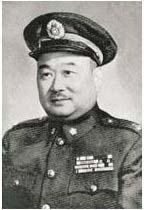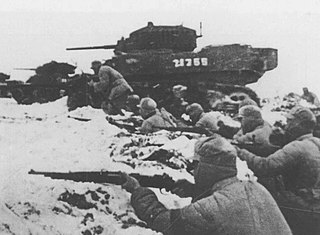
Liu Zhi was a prominent Kuomintang military and political leader in the Republic of China.

The Huaihai campaign, or Battle of Hsupeng, was one of the military conflicts in the late stage of the Chinese Civil War between the Kuomintang and the Communist Party of China. The campaign started when the People's Liberation Army (PLA) launched a major offensive against the Kuomintang headquarters in Xuzhou on 6 November 1948, and ended on 10 January 1949 when the PLA reached the north of the Yangtze.
The following units and commanders fought in the Defense of the Great Wall of the Second Sino-Japanese War. List as of 20 March 1933.

Sun Lianzhong was a Chinese general during the Warlord Era, Second Sino-Japanese War and Chinese Civil War. Best known for his commanded of the 2nd Group Army in the Battle of Taierzhuang, he had a long career in the army.

Feng Zhanhai, or Feng Chan-hai, was one of the leaders of the volunteer armies resisting the Japanese and the puppet state of Manchukuo in northeast China. Feng was born on November 6, 1899. At eighteen he joined the Dongbei Army, and later entered a military school graduating in 1921. After he graduated, he was successively a platoon leader, company commander, and battalion commander. At the time of the Mukden Incident and Japanese invasion of northeast China he was a colonel commanding a regiment of the Kirin Guards Division.
Dingtao Campaign (定陶战役) was a series of battles fought between the nationalists and the communists during Chinese Civil War in the post World War II era, and resulted in the communist victory.
The Order of battle Peiking–Hankou Railway Operation

Liu Ruming, Liu Ju-ming, 刘汝明; 12 May 1895 – 28 April 1975) was a ROC Army general during the Warlord Era, Second Sino-Japanese War and Chinese Civil War.

Feng Zhi'an was a Chinese Nationalist Lieutenant-General during the Second Sino-Japanese War, and Chinese Civil War from Hebei.
The Inner Mongolian campaign in the period from 1933 to 1936 were part of the ongoing invasion of northern China by the Empire of Japan prior to the official start of hostilities in the Second Sino-Japanese War. In 1931, the invasion of Manchuria secured the creation of the puppet state of Manchukuo and in 1933, Operation Nekka detached the province of Jehol from the Republic of China. Blocked from further advance south by the Tanggu Truce, the Imperial Japanese Army turned its attention west, towards the Inner Mongolian provinces of Chahar and Suiyuan, with the goal of establishing a northern China buffer state. In order to avoid overt violation of the Truce, the Japanese government used proxy armies in these campaigns while Chinese resistance was at first only provided by Anti-Japanese resistance movement forces in Chahar. The former included in the Inner Mongolian Army, the Manchukuo Imperial Army, and the Grand Han Righteous Army. Chinese government forces were overtly hostile to the anti-Japanese resistance and resisted Japanese aggression only in Suiyuan in 1936.
The Battle of Xuzhou was fought in May 1938 as part of the Second Sino-Japanese War.

Guan Linzheng was a highly successful Chinese general in the Kuomintang who fought against both the Communists and the Imperial Japanese Army, and was a recipient of Order of Blue Sky and White Sun, the highest honor for a Chinese Nationalist commander.
Li Yannian was a Kuomintang lieutenant-general from Shandong.
The Campaign at the China–Burma border was a series of battles fought at and around the China–Burma border after the Chinese Civil War, with the communist People's Republic of China (PRC) and the Union of Burma on one side and the nationalist forces of the Republic of China (ROC) on the other. It is known officially in China as the Sino-Burmese border Surveying and Security Operation (中缅边境勘界警卫作战).
Huang Baitao, also known as Huang Botao (黄伯韬), was a Chinese Nationalist general active in the Second Sino-Japanese War and Chinese Civil War, for which he was twice awarded the Order of Blue Sky and White Sun, the second highest military award in the Nationalist and then Republic of China military honors system.

Qiu Qingquan was a ROC Army general who excelled himself in Northern Expedition, anti-communist Encirclement Campaigns, Second Sino-Japanese War, and Chinese Civil War. In the Huaihai Campaign, which was determining battle of the Chinese Civil War, he failed to save General Huang Baitao's 7th corps and later committed suicide on the battlefield.
Huang Wei was a Chinese Nationalist military general who fought in the Encirclement Campaigns, Second Sino-Japanese War and Chinese Civil War.
Shi Pu (時溥), formally the Prince of Julu (鉅鹿王), was a warlord of the late Tang dynasty, who controlled Ganhua Circuit as its military governor (Jiedushi). He was eventually defeated by Zhu Quanzhong's general Pang Shigu (龐師古), and committed suicide with his family.

Wang Shin-lung is a general officer of the Republic of China (ROC) in Taiwan. He became Commanding General of the Republic of China Army on 1 December 2016.

The Chiang-Gui War was a military conflict between the Nationalist government of Chiang Kai-shek against the warlord army of Guangxi that lasted from March until June 1929. A later conflict, the 2nd Chiang Gui-War, occurred between the two opposing factions in November and December of the same year.









